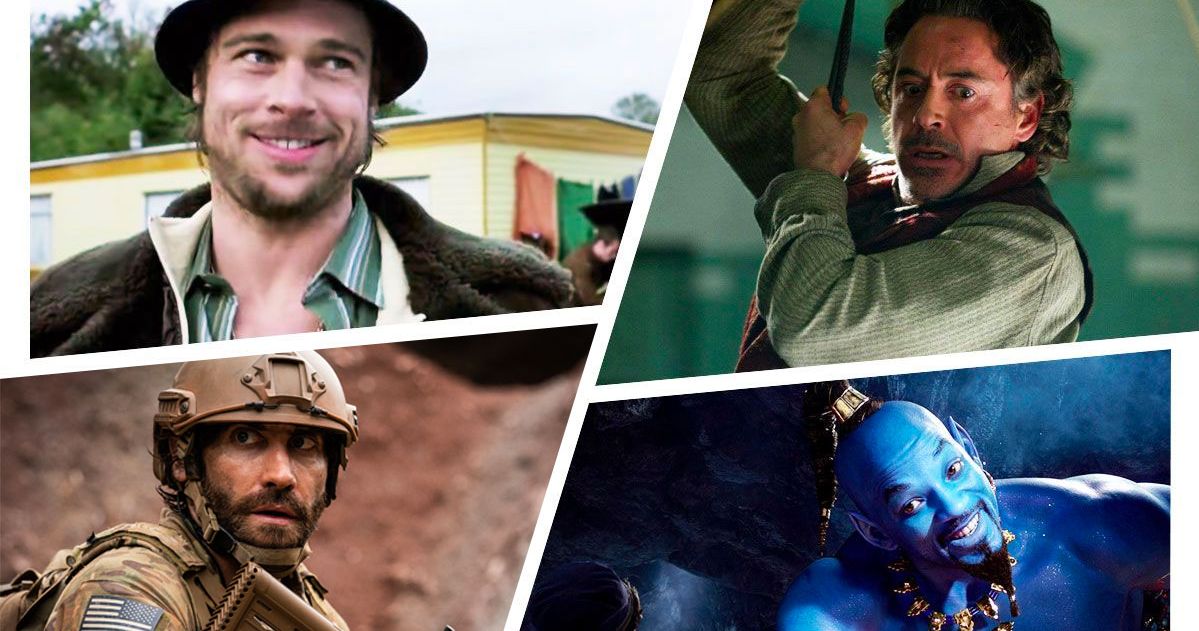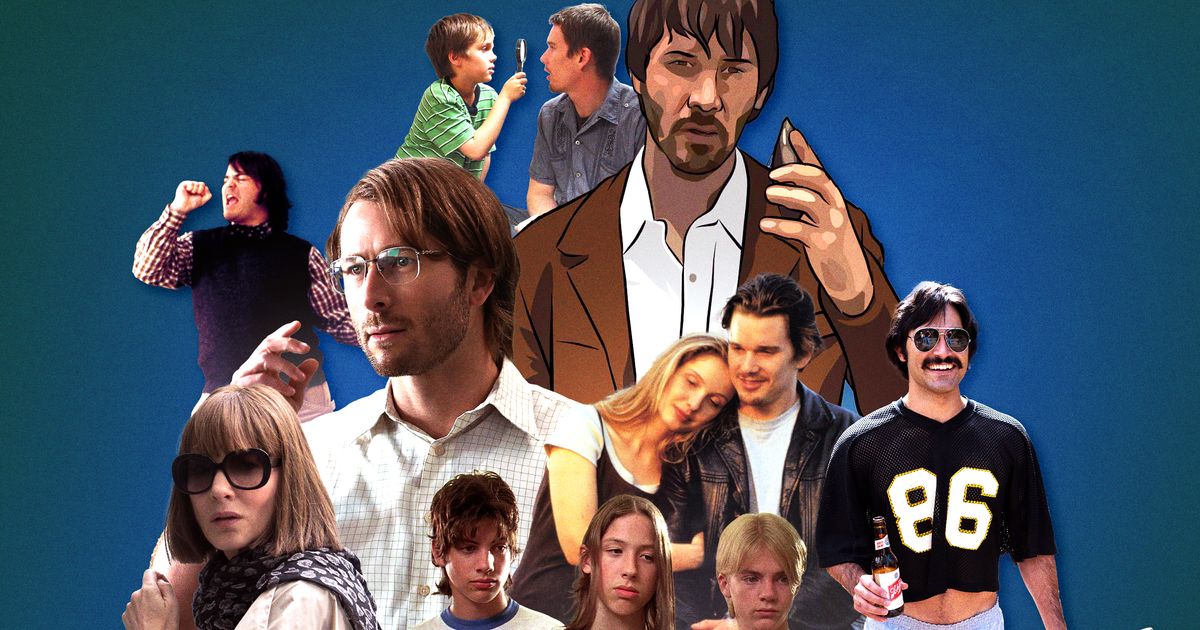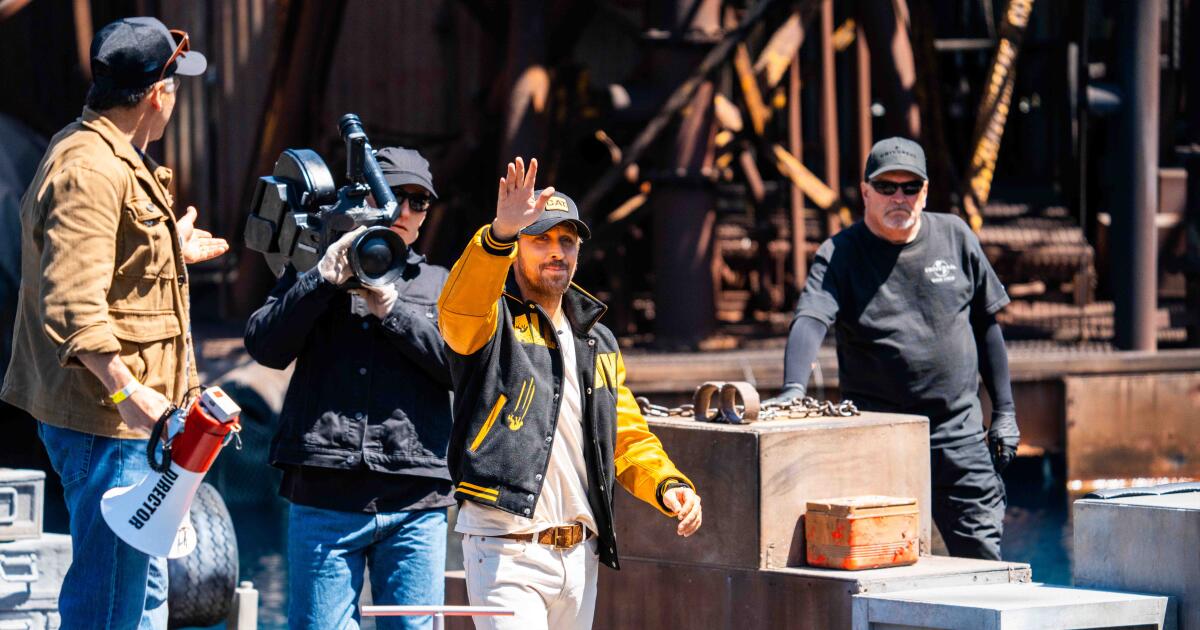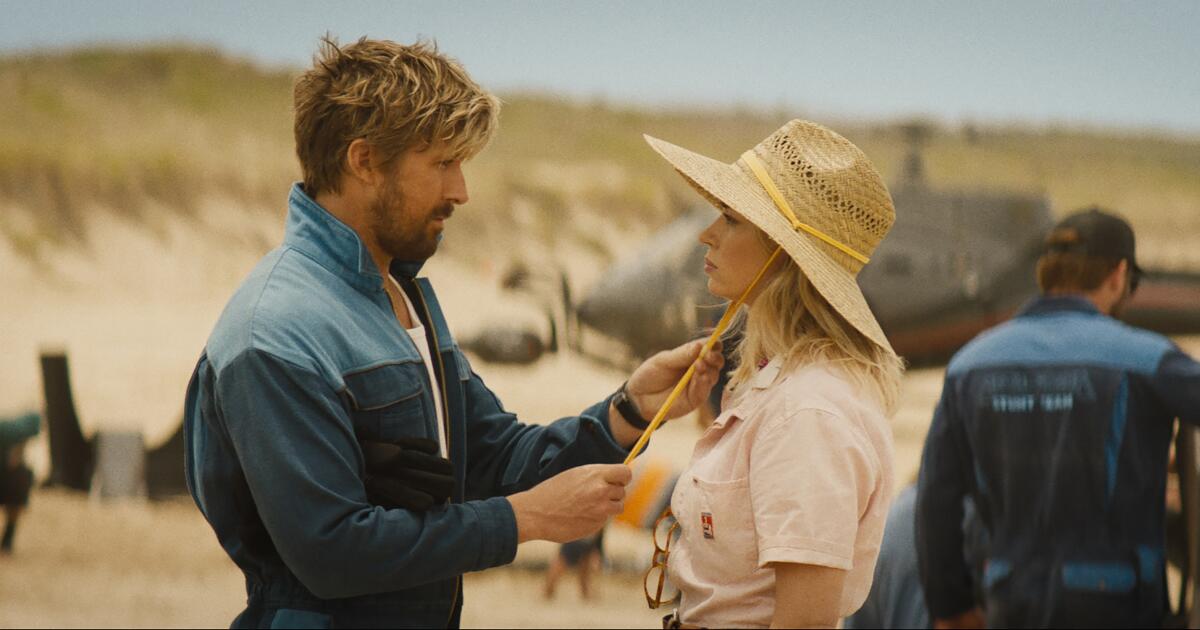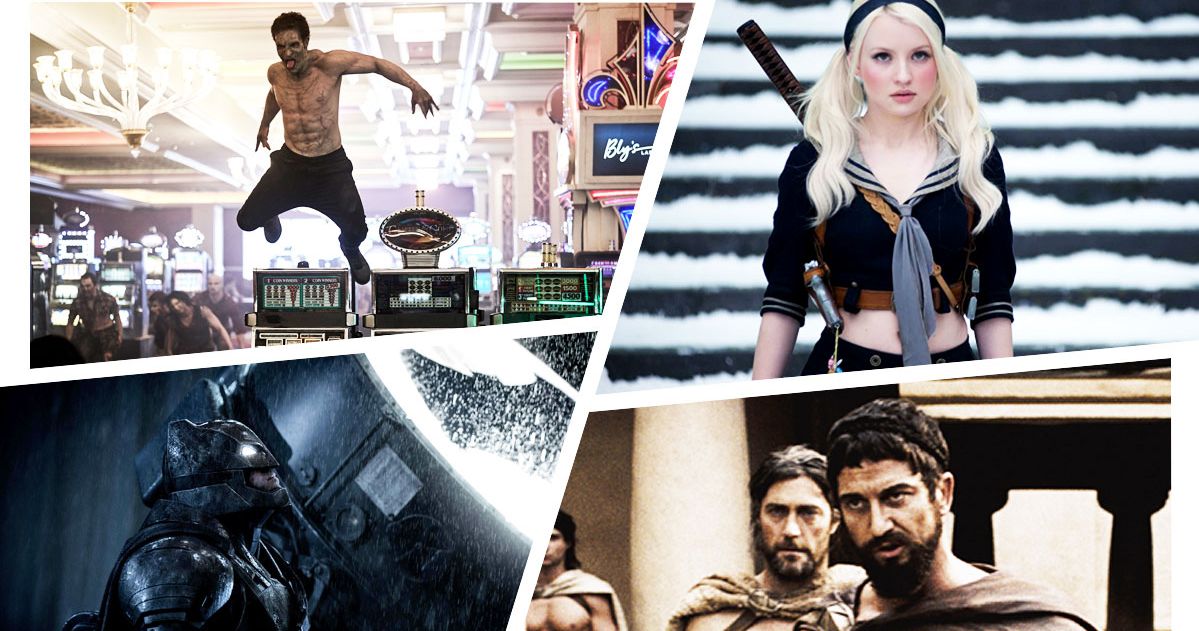Photo-Illustration: Vulture. Photos courtesy of the studios.
This article was originally published on May 10, 2021. It has been updated with the addition of Guy Ritchie’s most recent films, including The Ministry of Ungentlemanly Warfare.
It is honestly difficult to come up with a modern filmmaker with a weirder, almost nonsensical, career than Guy Ritchie’s. How in the world does the person who made Snatch and Lock, Stock, and Two Smoking Barrels even live on the same plane of human existence as the person who made Aladdin? And this is to say nothing of the movie he made starring his then-wife Madonna.
Ritchie’s high-energy macho style is, obviously, not for everyone, which is another reason it’s so remarkable that he has transitioned so easily to big-budget Hollywood movies, from the Sherlock Holmes films to Aladdin, by far his biggest hit. But it makes a certain amount of sense because Ritchie’s movies, even the better ones, aren’t really about anything. They are pure sensation, style for the sake of style. That’s not always a terrible thing: At his best, his flicks have the rush of whippets … even if they come with the accompanying loss of brain cells. The guy knows how to make a movie move, and that comes in handy, even if you’re just painting Will Smith blue. It’s not a particularly coherent career. But as his blue-collar blokes might say: It’s a living.
Here, a ranking of Ritchie’s films, from worst to best.
Considering how obsessed tabloids were with the marriage of Madonna to the tough-guy Brit auteur — and how much of a Sisyphean task it would be to remake Lina Wertmüller’s notorious 1974 film with one of the most famous women on the planet — Ritchie could have made an absolutely perfect film and odds are that critics would have torn it apart anyway. Well, uh, Swept Away is pretty much the opposite of perfect, so you can imagine how that went. Much of the critical vitriol was saved for Madonna, and to be clear, she is definitely not great in this, but what’s most striking is how limp and slack Ritchie’s screenplay and direction are. One would think a married couple’s supposed passion project would have some sort of oomph behind it, but this is as sleepy a movie as Ritchie is capable of making. It’s not actually the worst film ever made. But for most of its running time, though, it sure does feel that way.
Madonna and Ritchie’s relationship lasted more than eight years and produced two seemingly happy, lovely children, but, boy, were the movies he made during that era duds. This one isn’t worse than Swept Away, but it may be the more annoying movie, as Ritchie attempted to fuse the tough-guy brashness of his first two films with his new pseudo-philosophical Kabbalah obsessions. The result is an entirely incoherent crime thriller that features gangsters prattling on about the self and the ego and the soul and then occasionally wandering into an entirely different scene where other gangsters are prattling on about the same thing. (This movie would totally get beaten up by Ritchie’s first two movies.) Revolver is almost purposely impossible to follow, and it’s not clear what Ritchie is even trying to accomplish. He seems to have realized the extent of his misfire here, and you could argue he spent the rest of his career trying to make as many people as possible forget it ever existed. Mission accomplished?
Coming out at a time when every even halfway recognizable piece of intellectual property was trying to be spun into a franchise, King Arthur: Legend of the Sword is emblematic of all the downsides to that approach. Charlie Hunnam plays Arthur, who must rise to glory Gladiator style after his evil uncle (Jude Law) wrests away control of the kingdom following his dad’s killing. There’s some of the patented Ritchie showmanship, but mostly you get the same boring ingredients that are cynically mixed together whenever a studio smells a new cinematic universe: Legend of the Sword is a gritty reboot that’s also a dark origin story, all so that we’re set up for the sure-to-be sequel to come. (Oh man, wait till we get to see that Round Table in part two!) No doubt Warner Bros., which had previously hired Ritchie to do the same thing for Sherlock Holmes, hoped lightning would strike twice. That didn’t happen: This film bombed, ending any hope of further installments. More depressingly, it felt like Ritchie was trying to will a blockbuster into existence; he has rarely seemed so self-conscious in his approach.
Well, the notion of Ritchie doing a Bond movie doesn’t sound like a horrible idea, and it might not have been if Ritchie really had the energy to do one. Instead, this oft-delayed, mostly hidden release feels drowsily DOA, with Jason Statham sleepwalking and smirking through a dull heist story that never once rouses from its slumber. Hugh Grant gives it the old college try with a Cockney accent as the villain, but a movie-star subplot never gets off the ground, perhaps because the movie star is played by Josh Hartnett and everybody knows Josh Hartnett isn’t a movie star. Ritchie’s dialogue is oddly lazy here, as if he were trying to set up a franchise more than making a movie. (It doesn’t work.) Ever wonder if it was possible for Aubrey Plaza to be dull in a movie? Somehow, it is.
After the commercial and critical failure of his King Arthur movie, you could understand why Ritchie would go for a surefire hit as his follow-up. But that rationale does little to minimize how bizarre it was to learn that he’d be doing a live-action Aladdin — or to watch the actual film. A proud member of that vast, underwhelming category of bearably mediocre blockbusters, this remake of the ’90s smash has the same issue as so many of Disney’s redos: It mimics the plotline of the original but fails to summon up the same magic. Aladdin looks as expensive as it no doubt was to make, and, sure, Will Smith is mildly endearing as the genie. As for the rest of the cast members, they barely register, and Ritchie’s attempt to pump up the spectacle and comedy fall flat. The man is best when his characters are a bit scabrous, which is the exact opposite of what you want from a Disney film. (Not that its creative limitations mattered: The thing made $1.1 billion.)
Not to be confused with The Gentlemen (his 2019 film) or The Gentlemen (his 2024 Netflix series inspired by his 2019 film), The Ministry of Ungentlemanly Warfare takes us back to World War II, when the British assembled a rogues’ gallery of crooks, killers, and scoundrels for a top-secret mission deep within Nazi-occupied Africa in order to blow up some boats. This ho-hum action-comedy is led by Henry Cavill, who (as he demonstrated previously in The Man From U.N.C.L.E.) has just the right flippant/debonair attitude for this sort of high-style nonsense, but, beyond his marvelous facial hair, the character is a total zero. Same goes for the rest of the ensemble, who all seem to be auditioning for a Quentin Tarantino movie. Whatever your feelings about Tarantino, give the Oscar winner this: His genre subversions and outrageous digressions are far livelier and more inspired than anything Ritchie concocts here. Alternate title: Indistinguishable Basterds.
Ritchie is a maximalist by nature, and a part two in a franchise always tries to top the original. So you can imagine what A Game of Shadows was like: It’s way bigger than the already supersize first installment, but not necessarily better. (And losing Rachel McAdams’s comic spark was a disappointment — she’s barely in the movie.) Jared Harris makes for a compelling Moriarty, and Downey and Law maintain their bro-y chemistry, but the novelty of Ritchie’s reimagining of Sherlock Holmes can’t help but feel a bit stale on the second go-round. He wouldn’t make another film for four years, which makes sense: After churning out two of these in a row, you’d probably need a break to recharge the batteries.
People don’t usually turn to Guy Ritchie movies for profound insights into the human condition, but with The Covenant he has crafted a heartfelt drama about an American soldier (Jake Gyllenhaal) and an Afghan interpreter (Dar Salim) who become friends, only for the American to learn how his government mistreats the Afghan locals who risked their lives to help the U.S. during the occupation. It’s a damning story worth telling, but perhaps unsurprisingly, The Covenant works best when Ritchie falls back on the things he does well — namely, blowing stuff up. When it comes to character development or political commentary, the movie unfortunately feels a lot less confident. Putting his name in the title doesn’t help matters either, suggesting a self-seriousness and pride of authorship that haven’t been earned.
The last film Ritchie made while married to Madonna, it feels like a conscious effort for Ritchie to get back to basics. In this case, that’s just getting a bunch of British actors together to do some British-gangster shit, and while the movie is hardly inspired — it really does feel like Ritchie actively reminding himself how to make a movie after the flops Swept Away and Revolver — he is helped by some terrific actors. Do you want to watch Tom Wilkinson just do British-gangster shit for two hours? Who wouldn’t, right? You can just line them up: Gerard Butler, Mark Strong, Idris Elba, Toby Kebbell, Thandiwe Newton, and, of course, Tom Hardy, playing a man named “Handsome Bob.” This is all ridiculous and familiar, but you can sort of sense Ritchie stretching his legs and starting to feel like himself again. RocknRolla plays like an audition to get to make bigger movies again, and one has to say: It worked.
If you were only watching the trailers for this Jason Statham thriller — trailers that essentially scream, “Aren’t you ready to get back to the theaters and KICK SOME ASS??!! — you might think this is a cheeky return-to-form for both Ritchie and Statham, a giddy over-the-top thrill ride. And while there are some colorful gangsters with colorful names, what’s perhaps most surprising about Wrath of Man is how serious and dark it is. This is a straight-up revenge saga, with Statham as a father out to wreak havoc on the men who killed his teenage son, and the movie, after a jokey stage-setting intro, mostly eschews Ritchie’s usual quips and one-liners. This is basically Ritchie’s version of Heat, a crime drama about a driven, tortured man who won’t stop until everyone who has wronged him is dead. Ritchie brings a grim professionalism to the project as well as a shifting timeline and a solid cast (including Andy Garcia, Holt McCallany, Scott Eastwood, Josh Hartnett, and Jeffrey Donovan) that makes the movie feel a little more interesting than it really is. But it’s solidly done and efficient, even if nothing much sticks to the ribs.
Before Ritchie got his hands on him, the predominant image of Sherlock Holmes was that of a brainy, witty, slightly effete detective — certainly you didn’t picture him as a bare-knuckle bruiser. Sherlock Holmes changed all that, casting Robert Downey Jr. as a Holmes whose mind is as quick as his fists. As part of the film’s supercharged style, Ritchie switches to slo-mo so that we can hear Holmes’s thought process as he, say, strategizes how best to pummel his opponent in the boxing ring. Downey was ascending to superstardom at this time thanks to Iron Man, and Sherlock Holmes landed at the perfect time, showing off his muscular physique and sharp comic timing. (And Law is a fine foil as Watson.) Pitched to the multiplex masses, this Sherlock Holmes is too overblown and earsplitting to capture the nuance of Arthur Conan Doyle’s hero, and all told, it’s engaging enough while feeling rather anonymous. But it was fun to see Ritchie, who had never operated with a budget of this level, pulling out all the stops.
Writing about RocknRolla, Roger Ebert said, “British actors love playing gangsters as much as American actors love playing cowboys,” and The Gentlemen is just further proof, especially how the tradition seems to be passed down from generation to generation. What was once Mark Strong and Idris Elba is now Charlie Hunnam and Henry Golding. (Americans Matthew McConaughey and Jeremy Strong get to play this time, too.) This movie feels too much like Ritchie playing his greatest hits, but he’s more comfortable this time, less desperate to prove himself. The result is almost … well, not relaxed, exactly, but certainly at ease in his own skin. Ritchie will likely be making movies like this — just like this — when he’s 94.
For years, this big-screen remake of the 1960s spy series languished, with Steven Soderbergh and George Clooney briefly involved in an adaptation before stepping aside. Then Ritchie came onboard and delivered a stylish, gorgeous-looking Cold War romp, pairing Henry Cavill and Armie Hammer as mismatched government operatives who must work together to stop an underground criminal syndicate. This involves joining forces with the daughter (Alicia Vikander) of a missing scientist, setting the stage for secret identities, cover stories, and lots of fabulous outfits. Because it opened in the dog days of August — usually a dumping ground for studios — The Man From U.N.C.L.E. was presumed to be a failure before anyone had even seen it. (Plus, no offense, but Ritchie isn’t quite up to Soderbergh’s level.) As a result, this remake has been hailed in some quarters, regarded as unfairly maligned and celebrated for its breezy, sexy cast. (There’s also Elizabeth Debicki as a suave Nazi.) Neither a disaster nor a misunderstood masterpiece, The Man From U.N.C.L.E. finds Ritchie having a total blast with the throwback material, adrenalizing the ’60s settings with cutting-edge action spectacle. Ultimately, it’s all a little too shallow and disposable, but you won’t feel bad giving it a try on a lazy Sunday afternoon.
When Ritchie made his directorial debut with this brash, badly behaved crime comedy, it was constantly compared to Trainspotting and the films of Quentin Tarantino. Funny thing about that, though: “Danny Boyle I have no interest in whatsoever,” Ritchie said at the time, adding that he’d never seen Reservoir Dogs, “[a]nd now I’m past the point where I’m too frightened [to] see the fucking thing.” (He also didn’t have much of anything nice to say about another British crime film, The Krays, declaring, “I thought [it] was terrible. I always felt if I made The Krays, I would have made a fucking good film.”) That kind of impolitic talk is appropriate for a young hotshot determined to take on the world — just like Lock, Stock, and Two Smoking Barrels thumbs its nose at your delicate sensibilities, giving us a bunch of gangsters, crooks, lowlifes, and card sharps who trade potshots when they’re not meting out violence. It’s a heist film in which the atmosphere and attitude are most important — and you can’t say Ritchie didn’t have an eye for talent. Vinnie Jones and Statham got their starts here, and in a sense so did a specific strain of laddish British crime flick that would attract a worldwide audience and make Ritchie a household name.
Snatch was well reviewed when it came out, but the central criticism of it was that it was too similar to Barrels, even reusing similar plot points. Eventually, 20-plus years later, everyone would realize all of Ritchie’s crime movies were basically riffs on the same thing, slightly different variations of the same song, and that helps one appreciate that Snatch is probably the Platonic ideal of what Ritchie is trying to do: You’ve got colorful characters with crazy names (“Mullet,” “Brick Top,” “Doug the Head”) screaming and bashing people’s heads in and getting themselves into impossible situations, not being even close to intelligent enough to find their way out. Snatch is the funniest and most kinetic of all Ritchie movies and the least self-conscious: He is just flooring it, and good for him. It also features, gloriously, Brad Pitt’s boxer Mickey O’Neil, a character not in Ritchie’s original script who just shows up and — because Pitt couldn’t master a London accent — mumbles gibberish before destroying everyone in his path. Nothing about O’Neil, the “pikey,” makes a lick of sense, but wow, does he seem like an absolute gas to play.




